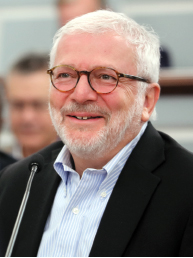How to fix the presidency
Five ways to move forward with executive branch reform
In fall 2023, the Miller Center convened more than 70 experts on politics and the presidency—senior officials from Democratic and Republican administrations, top scholars, and journalists—to discuss ideas for building a more responsible and effective American presidency.
When inviting this group to participate, the Center made clear that the event was intended not only to examine these ideas in an academic way but also to advance recommendations to improve the presidency. Building on conference insights, the Miller Center developed a multiyear work plan to promote and accelerate the most promising areas for executive branch reform. In each of five practice areas, a working group will develop solutions and engage with a wider group of committed citizens and organizations.
Sharing powers: The presidency and Congress
Whether because of executive aggrandizement or congressional dysfunction, presidents increasingly go it alone, relying on executive action to pursue policy goals instead of working within the legislative process. The relationship between the executive and legislative branches has always been somewhat contentious—evidence of constitutional checks and balances in action. Nevertheless, leaders of both political parties are worried about the current state of breakdown. Extreme partisanship is producing congressional gridlock and encouraging presidents to act on their own. For example, confirmations of senior military officials were delayed for almost five months in 2023 because of a hold placed by one member of the Senate. And at the outset of the Israel–Hamas conflict, no confirmed U.S. ambassadors were in place for Israel or Egypt. Opposing confirmations seems to have become a political industry for members of Congress, allowing outside groups to score political points and prevent an administration from accomplishing its agenda. This working group seeks to promote rules reform that would encourage moderation and bipartisan collaboration between the executive and legislative branches, particularly in relation to the broken federal appointment process.
Democracy and bureaucracy: Executive branch reform
President Donald Trump wanted to deconstruct the administrative state; President Joe Biden wanted to build it back better. Despite the political slogans, both parties embrace a variety of attitudes about the federal bureaucracy that shift according to domestic or foreign policy considerations, rulemaking and implementation, or even particular cabinet agencies. Meanwhile, the reality of governing is that, by law, our civil servants hold real responsibilities. Emergencies—terror attacks, economic crises, natural disasters, pandemics—often highlight the need for Congress and the president to work together. The usual problem is not Congress and the president failing to respond during an emergency but rather failing to plan in advance, separately and together. In late 2024 and early 2025, a major focus will be on advance planning and transition to the next presidential administration. The Miller Center has deep expertise in transitions. With partners, this practice area will promote best practices for effective executive branch functioning during the upcoming transition period.
Holding presidents accountable
The Center’s Conference on the American Presidency was not designed to discuss particular presidents. But the four indictments (including one conviction) against former President Trump raise unavoidable questions about the health of our democratic system and the rule of law. This practice area addresses potential reforms of the Insurrection Act, a 19th-century legal measure that endows the president with emergency powers. Each party worries about a president from the opposing party using and abusing emergency powers. Reforms suggested at the fall conference could provide congressional engagement. Miller Center scholarship and events on this topic can help educate the public about the constitutional and legal issues at stake.
Selecting responsible and effective presidents
Over the past 60 years, each party’s nominating process has increasingly empowered grassroots activists through presidential primaries and caucuses. In addition, the general election process does not grant equal electoral weight to citizens in each state. With the number of swing states reduced to a handful, a smaller and smaller slice of the country decides each presidential election. This shift likely reinforces the bias of the primaries, which already favor each party’s base. This practice area will consider reforms going into the 2028 election, when both parties will have an opportunity to nominate new candidates.
Presidents as national unifiers
Presidents have long struggled to unite, and even to define, the nation across geographical and political differences. But the country seems to have stopped believing that a president will pursue the interests of all Americans. While this practice area will not address the root causes of political polarization, it will call attention to the president’s role in communicating a shared, common purpose. Events and scholarship will explore how past presidents sought to define a more perfect union and how contemporary presidents can more effectively communicate their goals, including consideration of how new media technologies and environments can shape a more responsible and effective presidency.
On compromise: Joshua Bolten’s takeaway from the Center’s fall 2023 conference

Joshua Bolten is the CEO of Business Roundtable. His 20 years of government service included eight years working in George W. Bush’s White House, including as chief of staff.
America’s business leaders are among our most talented cohort of individuals, but I don’t think we can or should look to them to resolve our societal disagreements. But business does produce a mindset that we ought to encourage. If you’re the CEO of a major company, you cannot afford to alienate half your employees or half your customers. You figure out how to navigate so you bring people together within your organization in a common purpose. You guide other people, external to your organization, to a respect and appreciation of what you do.
I talked about maneuvering government institutions so that compromise is not only possible but necessary. Incentives are probably the most substantial part of finding compromise, and a lot of the political incentives are messed up right now. But there’s also an expectation of compromise that folks in government service ought to have—and that the American people should have for our elected leaders.
The Miller Center is good at bringing partisans together around commonsense principles. We can agree on governance while we’re disagreeing plenty on policy.
Taking time to reflect: Louisa Terrell on sharing White House wisdom
 Louisa Terrell is a managing director at Macro Advisory Partners. Her government career included serving as an assistant to President Joseph Biden and director of the White House Office of Legislative Affairs.
Louisa Terrell is a managing director at Macro Advisory Partners. Her government career included serving as an assistant to President Joseph Biden and director of the White House Office of Legislative Affairs.
The Miller Center has an excellent reputation and is well known for bringing together government practitioners for conversation and reflection. I was privileged to work at the White House. When you’re no longer in the middle of the demanding “everyday,” you’re able to identify productive learnings. It was refreshing to discuss experiences and listen to new ideas at the Miller Center, where I found a diversity of viewpoints and of people, many of whom had also had the opportunity to work in other White Houses.
I’m interested in topics like best practices for presidential transitions and clarifying the responsibilities that the legislative and executive branches share, equally, for how to make things work better. My view as someone who has been in public service for a long time is that the everyday jobs of government—to make things more efficient, more fair, and more responsive—aren’t partisan issues. These are enduring values and goals. Making our government better should be something we can work on together, regardless of party.
